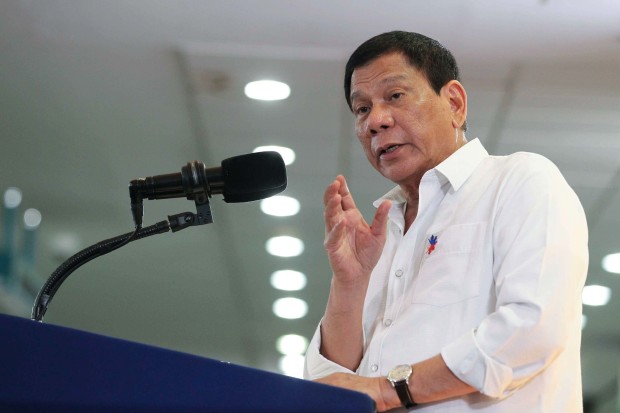The Commission on Human Rights (CHR) on Thursday denied it had formed a team to investigate President Duterte’s boast that he “personally killed” people when he was mayor of Davao City.
Agence France-Presse (AFP) reported earlier on Thursday that the CHR had formed a team to investigate Mr. Duterte’s boast after the UN human rights chief called for a murder probe.
AFP quoted a statement from CHR chief Jose Luis Gascon saying the commission had “reconstituted a team to further investigate [Davao death squads] to look into the new revelations and public admissions that may shed light on our previous findings.”
“The team will look into any matter that may further shed light on the killings in Davao that was the subject matter of our previous investigation,” AFP quoted Gascon as saying.
No new leads
Reached for comment, Gascon told the Inquirer that there were no new leads to reopen the commission’s investigation of Mr. Duterte’s alleged link to so-called death squads that had killed about 1,000 people in Davao when he was mayor of the city.
“We did not reconstitute an investigation team based on the recent statements of President Duterte and the response of United Nations High Commissioner [for Human Rights Zeid Ra’ad Al Hussein],” Gascon said.
He said the AFP report was “misleading.”
AFP said the statement was released by the CHR’s public information office, but it would call the office again for clarification.
Last week, Mr. Duterte said in a speech to businessmen gathered in Malacañang that when he was mayor of Davao, he “personally killed” people to set an example for police.
He said that as a newly elected mayor, he and several local policemen ambushed a group of suspected kidnappers shortly after the gang collected ransom from the parents of the released hostage, a local teenage girl.
“Maybe my bullets killed them, maybe not, but after the [firefight] they were all dead,” he said.
On Tuesday, Zeid issued a statement urging Philippine authorities to investigate Mr. Duterte for murder.
“The Philippines’ judicial authorities must demonstrate their commitment to upholding the rule of law and their independence from the executive by launching a murder investigation,” Zeid said.
“The killings committed by Mr. Duterte, by his own admission, at a time when he was a mayor, clearly constitute murder,” he said.
‘Idiot’
Mr. Duterte responded on Thursday, calling Zeid an “idiot” and just an “employee” of his who should stop telling him what to do.
“This guy is either a joker or a bit crazy. There is no [law] in my country [that] says I cannot threaten criminals,” Mr. Duterte said in a speech at a rally of community antidrug volunteers in Pampanga province.
He did not refer to his admission of killing people when he was mayor of Davao.
Mr. Duterte also called Zeid a “fool” and “stupid.”
He did not mention Zeid by name, but the reference to the UN human rights chief was clear.
According to Mr. Duterte, UN officials are employed by an organ composed of nations whose officials are elected by their people.
“You officials there sitting on your asses, we pay you your salaries. You idiot. You do not tell me what to do because I am your employer. Do not do it to a nation,” he said.
UN officials have little knowledge of international law, he said.
‘Son of a bitch’
“We contribute to the United Nations, you stupid son of a bitch,” he said, referring to Zeid.
“You’re just an employee there, who was appointed. Got it?” he added.
Mr. Duterte said Zeid “[struts] around” like a “sovereign idiot.”
He said Zeid did not know diplomacy.
“You do not know how to behave, to be an employee of the United Nations. You do not talk to me like that, you son of a bitch,” he said.
At the CHR, Gascon said the commission reconstituted at team of investigators a the end of 2015 “to dig deeper and continue from where they left in 2012.”
The team investigated more than 200 extrajudicial killings in Davao City, he said.
“We reconstituted the team last year after Duterte as a candidate then said he did not kill 700 but 1,700 criminals,” Gascon said.
“The team went to Davao to reinvestigate during the first quarter of 2016 but found difficulty finding new evidence beyond what they found back in 2012,” he said. —WITH REPORTS FROM TONETTE OREJAS, INQUIRER CENTRAL LUZON; AND AFP
